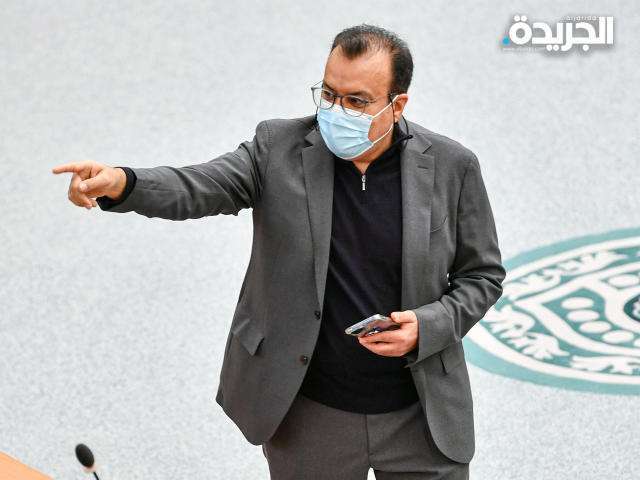Latest News
- Streets, Services, And Infrastructure To Be Developed In Shuwaik...
- Passports Of Kuwaitis Involved In Drug Crimes Abroad Revoked By...
- Right To Privacy And Respect For The Dead
- Compatriots Scam Egyptians
- Mother And Daughter Arrested For Prostitution And Extortion
- Two Male Nurses Break Bones In A Fistfight
- Former Minister Arrested On Arrival Over Graft
- Ministry Of Education Uncovers Salary Payments To Absentees
- Kuwait Banks Seek Clarity From Central Bank On Citizenship Revoc...
- Kuwait Organizes 30 Events To Protect Children From Tobacco Indu...
- Proposal For Residential City South Of 6.5 Ring Road Rejected Ov...
- Gulf Electrical Interconnection Project Will Boost Kuwait's Elec...
Government Hospitals To Be Allocated To Citizens Once The Daman Project Is Complete

The "Daman" project for expatriates, the largest health insurance project in the Middle East, will be finished and submitted to the ministry at the end of this year, according to a recent statement by the Minister of Health, Dr. Khaled Al-Saeed, who indicated that the decision to allocate government hospitals to treat only citizens is pending.
If the cost of health care offered to expatriates is very low for the state and the employer, it will be considered as favourable to the state and the business sector, according to a local Arabic newspaper. This trend will not be evaluated from the perspective of health, humanitarianism, or economics. If the cost of their health care is high for the state or even for the employer, hiring inexpensive workers from labor-exporting nations will not be economically feasible.
Therefore, allocating government hospitals to citizens only enables the state to provide exceptional health services to citizens, while also enabling the provision of appropriate and affordable health services in health insurance hospitals for expatriates, as well as to eradicate overcrowding in many clinics and hospitals.
To further explain the aforementioned, the following is shown by the scientific status of foreign workers in Kuwait by sectors:
— 51% of all expatriate workers in Kuwait can only read and write, meaning they have no formal education. This is broken down into 470 thousand workers, or 64 percent of all domestic workers, and 722 thousand workers, or 47 percent of all private sector workers.
In addition, 44,000 people work in the private sector are illiterate, 39,000 are domestic workers, and just 1,683 are employed by the government. Taking everything into account, we may estimate that there are 1 million 300,000 non-Kuwaiti workers in Kuwait who lack a high school diploma or who are illiterate. Does it make sense for the government or employer to pay for their health care at high prices that exceed.
According to statistics from the Public Authority for Civil Information, 1.214 million non-Kuwaiti workers in the private sector hold an average degree or less, making up more than 82 percent of all Kuwaiti citizens. If we exclude domestic and government workers and concentrate only on non-Kuwaiti workers in the private sector, who total 1.537 thousand workers, we will find.
Therefore, the government has two choices: either supply all residents with standard health services at no additional cost, or pay outrageous expenditures to give the same level of healthcare to more than twice as many people. Some may criticise this strategy and contrast it with industrialised nations like Britain, Canada, and others that do not distinguish between citizens, residents, or others while providing medical care.
But the truth is that everyone there—citizens, residents, and even tourists—pays taxes to the state, either directly or indirectly. Additionally, unlike in our scenario, the overall population of residents and visitors does not surpass a small portion of the total population of citizens. Because the states in these nations do not pay the costs associated with inhabitants and visitors, but rather profit from them in the same way that employers do, a comparison to those nations is not economically accurate.
We can only offer low-income immigrants health care at a level that is comparable to or slightly above the level of treatment they receive in their home country if we want to resolve this issue on a human level.
Given the advanced level of their education and the high level of their monthly pay, persons with high incomes are entitled to proper health care at no expense to the employer.
Government has two choices:
1. delivering common health services to everyone
2 - Spending a lot of money to treat twice as many people with equal care.
Trending News
-
 Expat Residency Law Amended By Kuwait Ministerial...
20 April 2024
Expat Residency Law Amended By Kuwait Ministerial...
20 April 2024 -
 Ministry Announces Separate Time For Amnesty Seeke...
21 April 2024
Ministry Announces Separate Time For Amnesty Seeke...
21 April 2024 -
 The Ministry Connects With Violators Of Residency...
23 April 2024
The Ministry Connects With Violators Of Residency...
23 April 2024 -
 AstraZeneca Admits Covid Vaccine Can Cause Rare Si...
29 April 2024
AstraZeneca Admits Covid Vaccine Can Cause Rare Si...
29 April 2024 -
 Work Permits Will Be Issued For One Year Under The...
27 April 2024
Work Permits Will Be Issued For One Year Under The...
27 April 2024 -
 3 Expats Caught In Salmiya With 213 Bottles Of Loc...
23 April 2024
3 Expats Caught In Salmiya With 213 Bottles Of Loc...
23 April 2024 -
 Temperature Increases Cause Electricity Load Index...
21 April 2024
Temperature Increases Cause Electricity Load Index...
21 April 2024 -
 Al-Nuer Festival Celebrates Kuwaiti Agriculture Wi...
22 April 2024
Al-Nuer Festival Celebrates Kuwaiti Agriculture Wi...
22 April 2024 -
 Peak-time 'cut-offs' Raise Fears Of An Electricity...
22 April 2024
Peak-time 'cut-offs' Raise Fears Of An Electricity...
22 April 2024 -
 Road Trip From Kuwait To Bahrain Via Saudi: Travel...
22 April 2024
Road Trip From Kuwait To Bahrain Via Saudi: Travel...
22 April 2024












Comments Post Comment